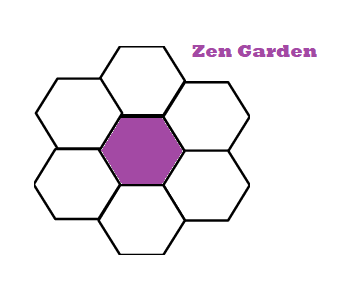There are Five Elements:
Fire (Authority),
Wood (Growth),
Water (Calm),
Metal (Creativity) and
Earth (Intelligence).
a concept of what the elemental icons could look like.
Fire gains Feng Shui from
Wood (Wood fuels Fire) and loses Feng Shui from
Water (Water extinguishes Fire)
Wood gains Feng Shui from
Water (Water grows Plants) and loses Feng Shui from
Metal (Metal Tools chop down Trees)
Water gains Feng Shui from
Metal (Minerals purify Water) and loses Feng Shui from
Earth (Dirt pollutes Water)
Metal gains Feng Shui from
Earth (Earth holds the Minerals) and loses Feng Shui from
Fire (Fire melts Metal)
Earth gains Feng Shui from
Fire (Ashes return nutrients back from the soil) and loses Feng Shui from
Wood (Plants drain the soil of nutrients)
In other words:
Fire should be placed
near Wood and
Earth, and
away from
Metal and
Water.
Wood should be placed
near Water and
Fire, and
away from
Earth and
Metal.
Water should be placed
near Metal and
Wood, and
away from
Earth and
Fire.
Metal should be placed
near Water and
Earth, and
away from
Wood and
Fire.
Earth should be placed
near Fire and
Metal and
away from
Wood and
Water.
(the above texts appear as tooltips whenever you would place a structure of the corresponding Element)
The following things gain an  Element:
Element:
Buildings
Improvements
Terrain features except for Natural Wonders. Featureless terrain is associated with
Fire by default. Terrain type is
not taken into account.
Resources.
Feng Shui in cities:
Every building is given an Element, except for Government buildings, Architectural Wonders and Environment buildings which are NEUTRAL, and don't interact with the system.
The Elemental reassignments do not necessarily follow usual Building Type guidelines. The Library-line is associated with
Wood, while the School-line is associated with
Earth (both are Education buildings)
Every correct
 Elemental
Elemental synergy from Buildings gives +2
 Feng Shui
Feng Shui, every incorrect one -1
 Feng Shui
Feng Shui. Neutral synergies don't give anything.
Feng Shui gives bonuses to the Building's BASE YIELD, as well as points towards the Harmony rating or penalties if they're negative.
Chinese buildings
do not get standard adjacency bonuses from building types, terrain or improvements.
Feng Shui on the map
Improvements, Resources and Terrain features are all affected. Improvements supercede Resources which supercede Terrain. In other words, building an improvment on a tile always changes its element to that of the improvement. If a Resource spawns to a tile, it overrides the tile's natural element until it is improved.
Every correct
 Elemental
Elemental synergy by an Improvement gives +1
 Feng Shui
Feng Shui, and every incorrect one -0.5
 Feng Shui
Feng Shui (rounded up). The same amount is also added to the Base Yield of the improvement.
As with buildings, Chinese Improvements
do not get Standard adjacency bonuses from adjacent Improvements.
Improvements are sorted into Elements like this:
Associated with
Fire:

Fortress,

Statue
Associated with
Wood:

Farm-like improvements
Associated with
Water:

Fishery,

Hamlet,

Monastery and

Observation Post
Associated with
Metal:



Camp-like Improvements,

Trading Posts
Associated with
Earth:

Mine-like Improvements
Neutral: Districts, Landmark Wonders
For the purpose of improvements, the following biomes and features give bonuses to the following Elements:
Fire: Open Terrain, Mountain, Volcano.
Wood: Vegetation
Water: Fresh Water (River, Lake, Navigable River) and Coast.
Metal: Rough Terrain
Earth: Wet, Cliffs
Fire Improvements (Fortress & Statue): boosted by Vegetation, harmed by Fresh Water and Coast.
Wood Improvements (Farms): boosted by Fresh Water and Coast, harmed by Rough Terrain
Water Improvements (Fishery, Hamlet, Monastery, Observation Post): boosted by Rough Terrain, harmed by Wet terrain or Cliffs
Metal Improvements (Camps, Trading Posts): Boosted by Wet Terrain or Cliffs, harmed by Open Terrain
Earth Improvements (Mines): Boosted by Open Terrain & Mountains, harmed by Vegetation.
Resource Elements are as follows;
Fire: Cider, Coffee, Furs, Gems, Incence, Ivory, Olive Oil, Pearls, Silk, Spices, Wine and Uranium
Wood: Cedar, Cocoa, Coconut, Cotton, Dyes, Hemp, Linen, Maize, Papyrus, Potato, Rice, Rubber, Tobacco and Wheat
Water: Banana, Dates, Figs, Fish, Honey, Lobster, Pineapple, Pomegranate, Seashells, Sugar, Tea and Whale Oil.
Metal: Aluminium, Clay, Copper, Coral, Gold, Gypsum, Iron, Mercury, Nitre, Petroleum and Silver.
Earth: Camels, Livestock, Horses, Granite, Jade, Limestone, Marble, Pigs, Salt and Wool.
(list of Resources subject to change)
The Chinese get additional lenses, tooltips and menus to help players plan their Cities accordingly.




 Great Works which give
Great Works which give  Population
Population
 Security Amenity and a
Security Amenity and a  Healthcare Amenity.
Healthcare Amenity. Festivals
Festivals
 Tourism based on
Tourism based on  Housing bonus
Housing bonus Trade Routes
Trade Routes
 Prestige
Prestige  Food base
Food base Force Limit and
Force Limit and 
 Feng Shui when placed adjacent to a synergistic Element, which also improves the structure's base yield per positive synergy.
Feng Shui when placed adjacent to a synergistic Element, which also improves the structure's base yield per positive synergy. Recreation,
Recreation, Environment,
Environment, 


 Chang'an
Chang'an Great Scientist or
Great Scientist or  Strength over the Spearman
Strength over the Spearman Efficiency in Cities per
Efficiency in Cities per  HP compared to the Galleon
HP compared to the Galleon Coin
Coin
